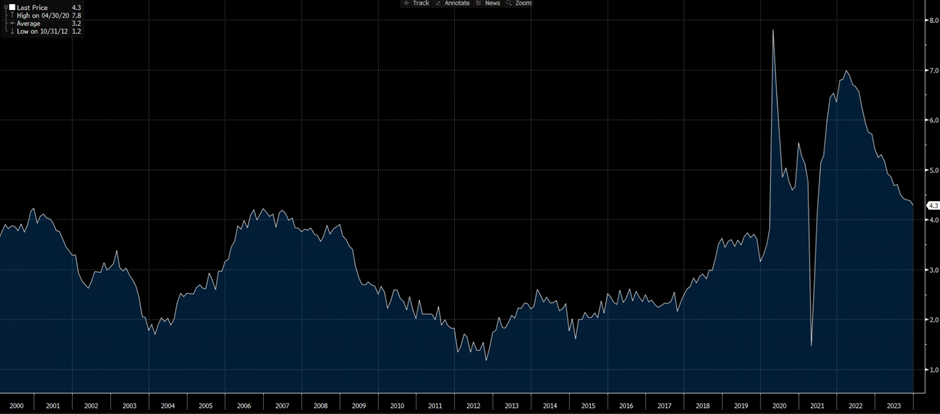5 key market trends we’re watching closely … and how to benefit from them
We covered recently that over the past 3 months, a plethora of global equity and bond indices have rallied strongly, but despite this welcome performance, our private wealth partners continue to allocate heavily to hedge funds, favouring alpha over beta, and looking for diversification, and non-directional exposures ("4 reasons why hedge fund allocations are on the rise"). This is largely driven by uncertainty over near-term outlooks and an expectation of volatility.
It’s certainly possible that this Goldilocks market environment continues, but there are a number of hurdles to overcome. In this uncertain environment, we are keeping a close eye on five trends, which we believe might impact the future direction of markets, and recommending specific hedge fund allocations accordingly.
The 5 trends, and the hedge fund strategies that may benefit are:
Defaults and Delinquencies
The rise in the cost of capital, following the aggressive Fed hiking cycle, coupled with a looming maturity wall is creating stress. Slowing consumer credit growth, given auto and credit card delinquencies are rising, coupled with tighter lending conditions from banks is putting further pressure on the system. Default rates have started to rise (refer Figure 1 below), and bankruptcy filings are modestly ticking up higher also (locally as well as globally, ASIC’s data shows that local bankruptcies are increasing materially, and have been since 2021).
Hedge fund allocation implication: This creates opportunities for Long/Short Credit funds with flexible and patient capital to deploy into select situations
Figure 1: US Default Rates (1997 to 2023)

Source: Moody’s Analytics, Apollo Chief Economist
Inflation is dead. Long Live inflation ?
The December 2023 SEP median dots projected rates would be 75bps lower 1 year ahead, as inflation rolled over with super core going from 5% to 3.5%. Today there are rationale arguments in the market for cuts anywhere between 50 to 200bps, depending on the path of growth, inflation, and unemployment. We remain focused on the decomposition of inflation, as well as the supply vs. demand undercurrents observed in the labour market; wage inflation in particular, (refer Figure 2 below), given it is coming into equilibrium slowly. Higher levels of volatility are expected to remain implicit from this wider range of distributions. Time will now tell if the current immaculate disinflation is just that, or a local trough before we get a 1980s-style double top in inflation.
Hedge fund allocation implication: These cross-currents and disagreements lead to a positive trading environment for Global Macro funds, especially those with a discretionary approach that can navigate the upcoming election cycle(s).
Figure 2: US Average Hourly Earnings, Production Nonsupervisory (2000 to 2023)
.png)
Changing single-name equity trading dynamics
One of the biggest challenge of 2023 was trying to navigate a complex inter-related game between fundamentals, positioning/flows, and macro drivers. One week de-grossing of crowded names would drive P&L, then the next week Fed commentary and rates volatility would swamp everything else.
The investment timeframe of markets has compressed, and become more short-term in nature, due to the increasing flows into market-neutral strategies across both fundamental investors and the increasing relevance of systematic/quant flows; on top the shift from active to passive has taken a large swathe of the market out.
Numerous trades in 2023 worked well; however, it proved hard for some participants to carry them to fruition, as their shortened duration meant they got stopped out of strong fundamental single-stock trades. This was most evident on the short-side, where short squeezes or the changing risk on/off nature of markets in 2023 forced trader to manage their overall portfolio. On top of the reduced duration of capital, the speed and velocity of moves has increased, due in part to the above dynamics, but also from tighter stop losses and liquidity (or lack thereof at times). We don’t believe there is enough evidence today to ascertain if this is a secular change or just a short-term dynamic playing out, as such we are observing intensely.
Hedge fund allocation implication: Currently, we believe it leads to focusing on the top tier funds within the Multi-Strategy universe, given some of these dynamics are zero-sum games, but at the same time, layering in complimentary Long/Short Equity strategies that can trade in less trafficked areas of the market and weather volatility better.
Fiscal deficits
Despite the unexpectedly good growth numbers in the US, there remain concerns about the US deficit. Supply-side issuance, all-in, is expected to hit roughly $2trn which the market needs to absorb. Today, when accounting for the demand side across foreign Central Banks retrenchment, pensions/households, and asset managers, we believe there remains a $1trn hole to fill, especially if the Fed continues on the path of QT. The US has observed their largest expansion in fiscal history post the pandemic and need to either cut the deficit to keep levels sustainable or grow out of it. The latter seems unlikely today given the absolute levels required. On the flipside leading into the US election neither candidate is running on a program of fiscal prudence, as such how or when the deficits gets cut is a question markets need to consider and digest accordingly.
Hedge fund allocation implication: With the supply of capital constrained, as primary dealers as a percentage of debt continues to remain low, coupled with our prior expectation of volatility remaining elevated, this situation requires intermediation capital which likely flows via high returns for fixed income RV traders
Japan vs. China
Japan appears to be the only DM country with elevated, sustained, and sticky levels of inflation. The next wage round/Shunto will likely give confidence to the BoJ to normalize their operating policy and begin by removing NIRP whilst relaxing YCC even further. In 2023 we observed the breakout of Japanese equities driven by several features: the aforementioned BoJ path of normalization, cheapness relative to the US, positive steps in corporate governance, and underweight positions even within internal household. This drove a decent flow of capital into the markets, on the flipside Chinese equities observed net outflows despite the reopening dynamics at the start of the 2023. Today China is staring down the barrel of a lost decade(s) with equities having already experienced a roller coaster ride at the start of the year.
Hedge fund allocation implication: In this environment, Asia-Pac long short equity funds with low directionality are well positioned to continue what has been very strong performance over the last 4-5 years.
In summary: defaults & delinquencies, inflation, changing single name equity trading dynamics, fiscal deficits, and Japan vs. China are the 5 key trends we expect to drive global markets in 2024. We’re recommending that allocators target specific hedge fund strategies and characteristics to protect against, and benefit from these trends, as outlined above.
5 topics

